ECON6010: Evaluating the Introduction of EITC in Australia, 2018
VerifiedAdded on 2023/06/03
|7
|1835
|119
Essay
AI Summary
This essay provides an economic evaluation of introducing an Earned Income Tax Credit (EITC) in Australia, a policy already in place in the United States. It uses economic theories like classical, Keynesian, and supply-demand to analyze the potential pros and cons of EITC on equity and efficiency grounds. The essay argues that EITC could incentivize work, reduce poverty, and improve living standards by increasing the income of low-income earners, leading to higher consumption and investment. However, it also acknowledges potential drawbacks such as inflation due to increased demand, government intervention hindering natural economic forces, and possible disincentives to work harder. The essay further discusses how the introduction of EITC might interact with existing government policies like the minimum wage, potentially affecting firms' wage decisions. It concludes that while EITC has positive impacts like health support and poverty reduction, its implementation requires careful consideration of its potential negative effects. Desklib is a great platform to find similar essays and solved assignments.

OPTION 1 1
OPTION 1
By Student’s Name
Course
Instructor
Institution
City, State
Date
OPTION 1
By Student’s Name
Course
Instructor
Institution
City, State
Date
Paraphrase This Document
Need a fresh take? Get an instant paraphrase of this document with our AI Paraphraser
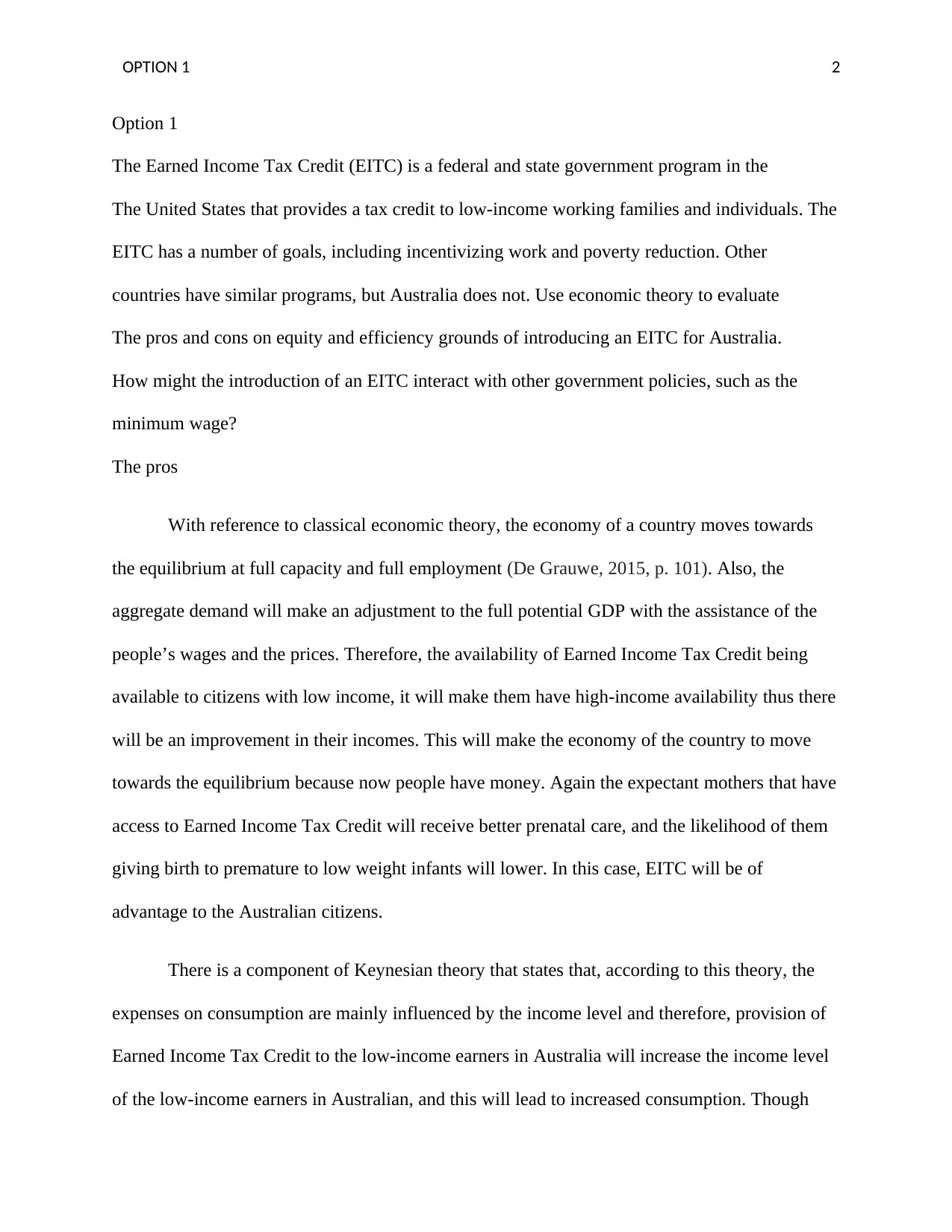
OPTION 1 2
Option 1
The Earned Income Tax Credit (EITC) is a federal and state government program in the
The United States that provides a tax credit to low-income working families and individuals. The
EITC has a number of goals, including incentivizing work and poverty reduction. Other
countries have similar programs, but Australia does not. Use economic theory to evaluate
The pros and cons on equity and efficiency grounds of introducing an EITC for Australia.
How might the introduction of an EITC interact with other government policies, such as the
minimum wage?
The pros
With reference to classical economic theory, the economy of a country moves towards
the equilibrium at full capacity and full employment (De Grauwe, 2015, p. 101). Also, the
aggregate demand will make an adjustment to the full potential GDP with the assistance of the
people’s wages and the prices. Therefore, the availability of Earned Income Tax Credit being
available to citizens with low income, it will make them have high-income availability thus there
will be an improvement in their incomes. This will make the economy of the country to move
towards the equilibrium because now people have money. Again the expectant mothers that have
access to Earned Income Tax Credit will receive better prenatal care, and the likelihood of them
giving birth to premature to low weight infants will lower. In this case, EITC will be of
advantage to the Australian citizens.
There is a component of Keynesian theory that states that, according to this theory, the
expenses on consumption are mainly influenced by the income level and therefore, provision of
Earned Income Tax Credit to the low-income earners in Australia will increase the income level
of the low-income earners in Australian, and this will lead to increased consumption. Though
Option 1
The Earned Income Tax Credit (EITC) is a federal and state government program in the
The United States that provides a tax credit to low-income working families and individuals. The
EITC has a number of goals, including incentivizing work and poverty reduction. Other
countries have similar programs, but Australia does not. Use economic theory to evaluate
The pros and cons on equity and efficiency grounds of introducing an EITC for Australia.
How might the introduction of an EITC interact with other government policies, such as the
minimum wage?
The pros
With reference to classical economic theory, the economy of a country moves towards
the equilibrium at full capacity and full employment (De Grauwe, 2015, p. 101). Also, the
aggregate demand will make an adjustment to the full potential GDP with the assistance of the
people’s wages and the prices. Therefore, the availability of Earned Income Tax Credit being
available to citizens with low income, it will make them have high-income availability thus there
will be an improvement in their incomes. This will make the economy of the country to move
towards the equilibrium because now people have money. Again the expectant mothers that have
access to Earned Income Tax Credit will receive better prenatal care, and the likelihood of them
giving birth to premature to low weight infants will lower. In this case, EITC will be of
advantage to the Australian citizens.
There is a component of Keynesian theory that states that, according to this theory, the
expenses on consumption are mainly influenced by the income level and therefore, provision of
Earned Income Tax Credit to the low-income earners in Australia will increase the income level
of the low-income earners in Australian, and this will lead to increased consumption. Though
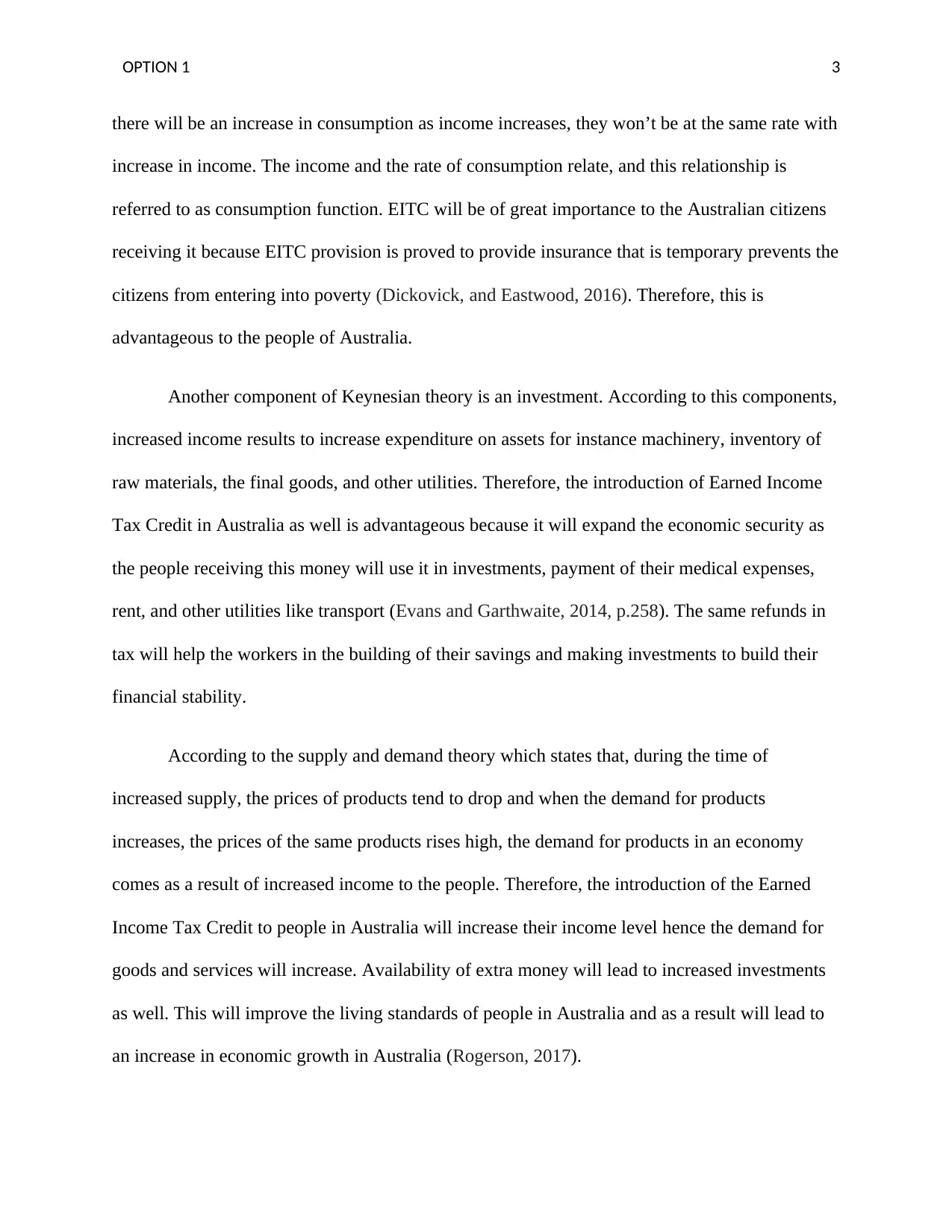
OPTION 1 3
there will be an increase in consumption as income increases, they won’t be at the same rate with
increase in income. The income and the rate of consumption relate, and this relationship is
referred to as consumption function. EITC will be of great importance to the Australian citizens
receiving it because EITC provision is proved to provide insurance that is temporary prevents the
citizens from entering into poverty (Dickovick, and Eastwood, 2016). Therefore, this is
advantageous to the people of Australia.
Another component of Keynesian theory is an investment. According to this components,
increased income results to increase expenditure on assets for instance machinery, inventory of
raw materials, the final goods, and other utilities. Therefore, the introduction of Earned Income
Tax Credit in Australia as well is advantageous because it will expand the economic security as
the people receiving this money will use it in investments, payment of their medical expenses,
rent, and other utilities like transport (Evans and Garthwaite, 2014, p.258). The same refunds in
tax will help the workers in the building of their savings and making investments to build their
financial stability.
According to the supply and demand theory which states that, during the time of
increased supply, the prices of products tend to drop and when the demand for products
increases, the prices of the same products rises high, the demand for products in an economy
comes as a result of increased income to the people. Therefore, the introduction of the Earned
Income Tax Credit to people in Australia will increase their income level hence the demand for
goods and services will increase. Availability of extra money will lead to increased investments
as well. This will improve the living standards of people in Australia and as a result will lead to
an increase in economic growth in Australia (Rogerson, 2017).
there will be an increase in consumption as income increases, they won’t be at the same rate with
increase in income. The income and the rate of consumption relate, and this relationship is
referred to as consumption function. EITC will be of great importance to the Australian citizens
receiving it because EITC provision is proved to provide insurance that is temporary prevents the
citizens from entering into poverty (Dickovick, and Eastwood, 2016). Therefore, this is
advantageous to the people of Australia.
Another component of Keynesian theory is an investment. According to this components,
increased income results to increase expenditure on assets for instance machinery, inventory of
raw materials, the final goods, and other utilities. Therefore, the introduction of Earned Income
Tax Credit in Australia as well is advantageous because it will expand the economic security as
the people receiving this money will use it in investments, payment of their medical expenses,
rent, and other utilities like transport (Evans and Garthwaite, 2014, p.258). The same refunds in
tax will help the workers in the building of their savings and making investments to build their
financial stability.
According to the supply and demand theory which states that, during the time of
increased supply, the prices of products tend to drop and when the demand for products
increases, the prices of the same products rises high, the demand for products in an economy
comes as a result of increased income to the people. Therefore, the introduction of the Earned
Income Tax Credit to people in Australia will increase their income level hence the demand for
goods and services will increase. Availability of extra money will lead to increased investments
as well. This will improve the living standards of people in Australia and as a result will lead to
an increase in economic growth in Australia (Rogerson, 2017).
⊘ This is a preview!⊘
Do you want full access?
Subscribe today to unlock all pages.

Trusted by 1+ million students worldwide
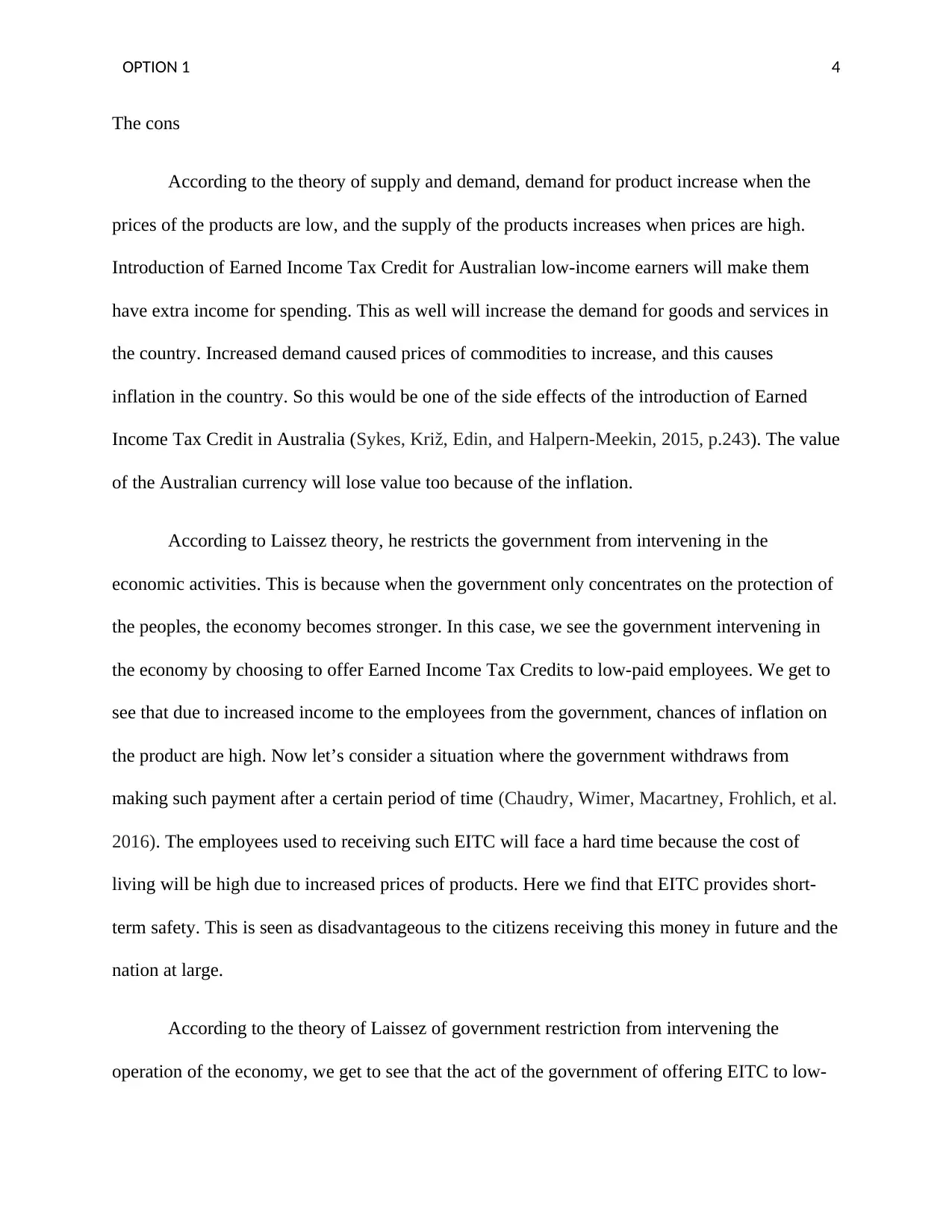
OPTION 1 4
The cons
According to the theory of supply and demand, demand for product increase when the
prices of the products are low, and the supply of the products increases when prices are high.
Introduction of Earned Income Tax Credit for Australian low-income earners will make them
have extra income for spending. This as well will increase the demand for goods and services in
the country. Increased demand caused prices of commodities to increase, and this causes
inflation in the country. So this would be one of the side effects of the introduction of Earned
Income Tax Credit in Australia (Sykes, Križ, Edin, and Halpern-Meekin, 2015, p.243). The value
of the Australian currency will lose value too because of the inflation.
According to Laissez theory, he restricts the government from intervening in the
economic activities. This is because when the government only concentrates on the protection of
the peoples, the economy becomes stronger. In this case, we see the government intervening in
the economy by choosing to offer Earned Income Tax Credits to low-paid employees. We get to
see that due to increased income to the employees from the government, chances of inflation on
the product are high. Now let’s consider a situation where the government withdraws from
making such payment after a certain period of time (Chaudry, Wimer, Macartney, Frohlich, et al.
2016). The employees used to receiving such EITC will face a hard time because the cost of
living will be high due to increased prices of products. Here we find that EITC provides short-
term safety. This is seen as disadvantageous to the citizens receiving this money in future and the
nation at large.
According to the theory of Laissez of government restriction from intervening the
operation of the economy, we get to see that the act of the government of offering EITC to low-
The cons
According to the theory of supply and demand, demand for product increase when the
prices of the products are low, and the supply of the products increases when prices are high.
Introduction of Earned Income Tax Credit for Australian low-income earners will make them
have extra income for spending. This as well will increase the demand for goods and services in
the country. Increased demand caused prices of commodities to increase, and this causes
inflation in the country. So this would be one of the side effects of the introduction of Earned
Income Tax Credit in Australia (Sykes, Križ, Edin, and Halpern-Meekin, 2015, p.243). The value
of the Australian currency will lose value too because of the inflation.
According to Laissez theory, he restricts the government from intervening in the
economic activities. This is because when the government only concentrates on the protection of
the peoples, the economy becomes stronger. In this case, we see the government intervening in
the economy by choosing to offer Earned Income Tax Credits to low-paid employees. We get to
see that due to increased income to the employees from the government, chances of inflation on
the product are high. Now let’s consider a situation where the government withdraws from
making such payment after a certain period of time (Chaudry, Wimer, Macartney, Frohlich, et al.
2016). The employees used to receiving such EITC will face a hard time because the cost of
living will be high due to increased prices of products. Here we find that EITC provides short-
term safety. This is seen as disadvantageous to the citizens receiving this money in future and the
nation at large.
According to the theory of Laissez of government restriction from intervening the
operation of the economy, we get to see that the act of the government of offering EITC to low-
Paraphrase This Document
Need a fresh take? Get an instant paraphrase of this document with our AI Paraphraser
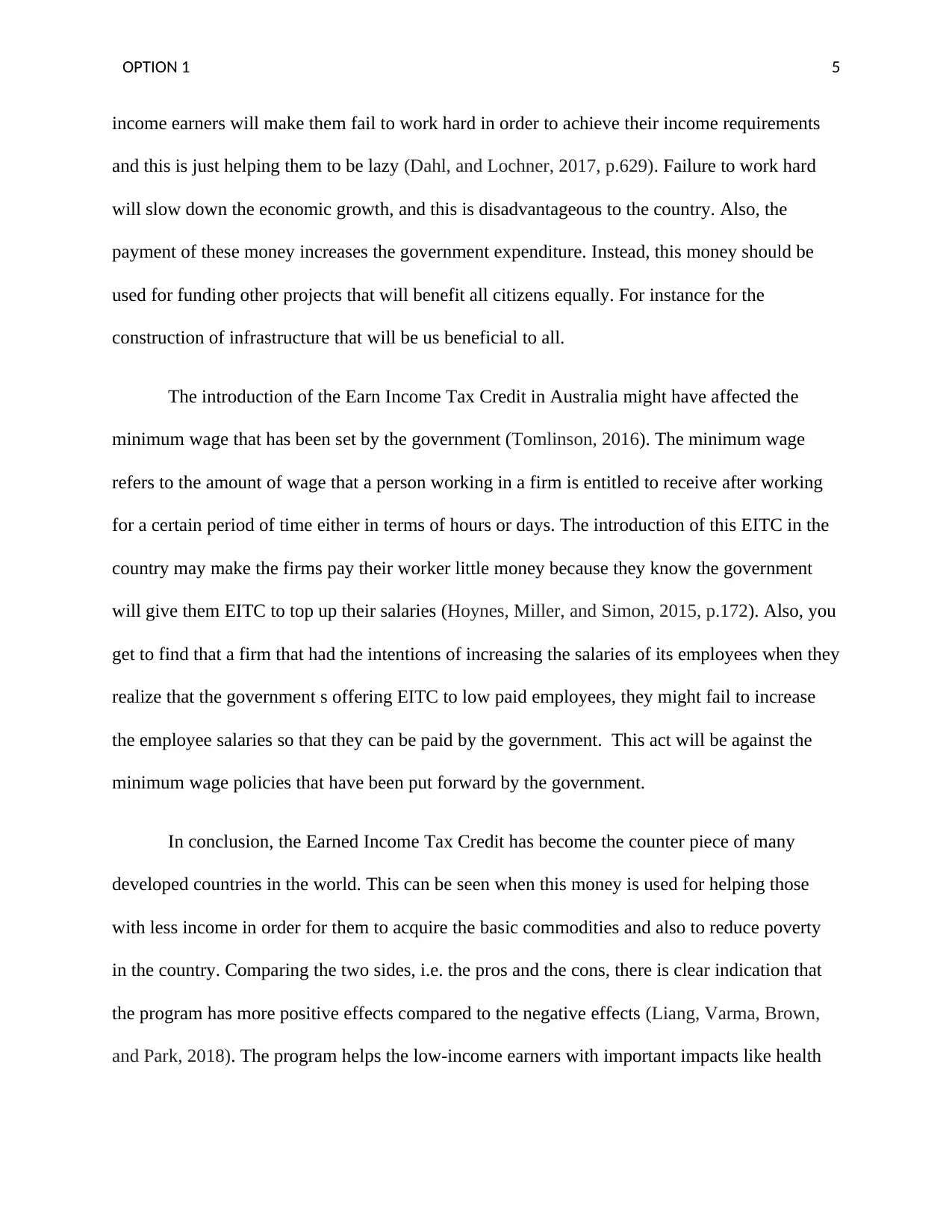
OPTION 1 5
income earners will make them fail to work hard in order to achieve their income requirements
and this is just helping them to be lazy (Dahl, and Lochner, 2017, p.629). Failure to work hard
will slow down the economic growth, and this is disadvantageous to the country. Also, the
payment of these money increases the government expenditure. Instead, this money should be
used for funding other projects that will benefit all citizens equally. For instance for the
construction of infrastructure that will be us beneficial to all.
The introduction of the Earn Income Tax Credit in Australia might have affected the
minimum wage that has been set by the government (Tomlinson, 2016). The minimum wage
refers to the amount of wage that a person working in a firm is entitled to receive after working
for a certain period of time either in terms of hours or days. The introduction of this EITC in the
country may make the firms pay their worker little money because they know the government
will give them EITC to top up their salaries (Hoynes, Miller, and Simon, 2015, p.172). Also, you
get to find that a firm that had the intentions of increasing the salaries of its employees when they
realize that the government s offering EITC to low paid employees, they might fail to increase
the employee salaries so that they can be paid by the government. This act will be against the
minimum wage policies that have been put forward by the government.
In conclusion, the Earned Income Tax Credit has become the counter piece of many
developed countries in the world. This can be seen when this money is used for helping those
with less income in order for them to acquire the basic commodities and also to reduce poverty
in the country. Comparing the two sides, i.e. the pros and the cons, there is clear indication that
the program has more positive effects compared to the negative effects (Liang, Varma, Brown,
and Park, 2018). The program helps the low-income earners with important impacts like health
income earners will make them fail to work hard in order to achieve their income requirements
and this is just helping them to be lazy (Dahl, and Lochner, 2017, p.629). Failure to work hard
will slow down the economic growth, and this is disadvantageous to the country. Also, the
payment of these money increases the government expenditure. Instead, this money should be
used for funding other projects that will benefit all citizens equally. For instance for the
construction of infrastructure that will be us beneficial to all.
The introduction of the Earn Income Tax Credit in Australia might have affected the
minimum wage that has been set by the government (Tomlinson, 2016). The minimum wage
refers to the amount of wage that a person working in a firm is entitled to receive after working
for a certain period of time either in terms of hours or days. The introduction of this EITC in the
country may make the firms pay their worker little money because they know the government
will give them EITC to top up their salaries (Hoynes, Miller, and Simon, 2015, p.172). Also, you
get to find that a firm that had the intentions of increasing the salaries of its employees when they
realize that the government s offering EITC to low paid employees, they might fail to increase
the employee salaries so that they can be paid by the government. This act will be against the
minimum wage policies that have been put forward by the government.
In conclusion, the Earned Income Tax Credit has become the counter piece of many
developed countries in the world. This can be seen when this money is used for helping those
with less income in order for them to acquire the basic commodities and also to reduce poverty
in the country. Comparing the two sides, i.e. the pros and the cons, there is clear indication that
the program has more positive effects compared to the negative effects (Liang, Varma, Brown,
and Park, 2018). The program helps the low-income earners with important impacts like health
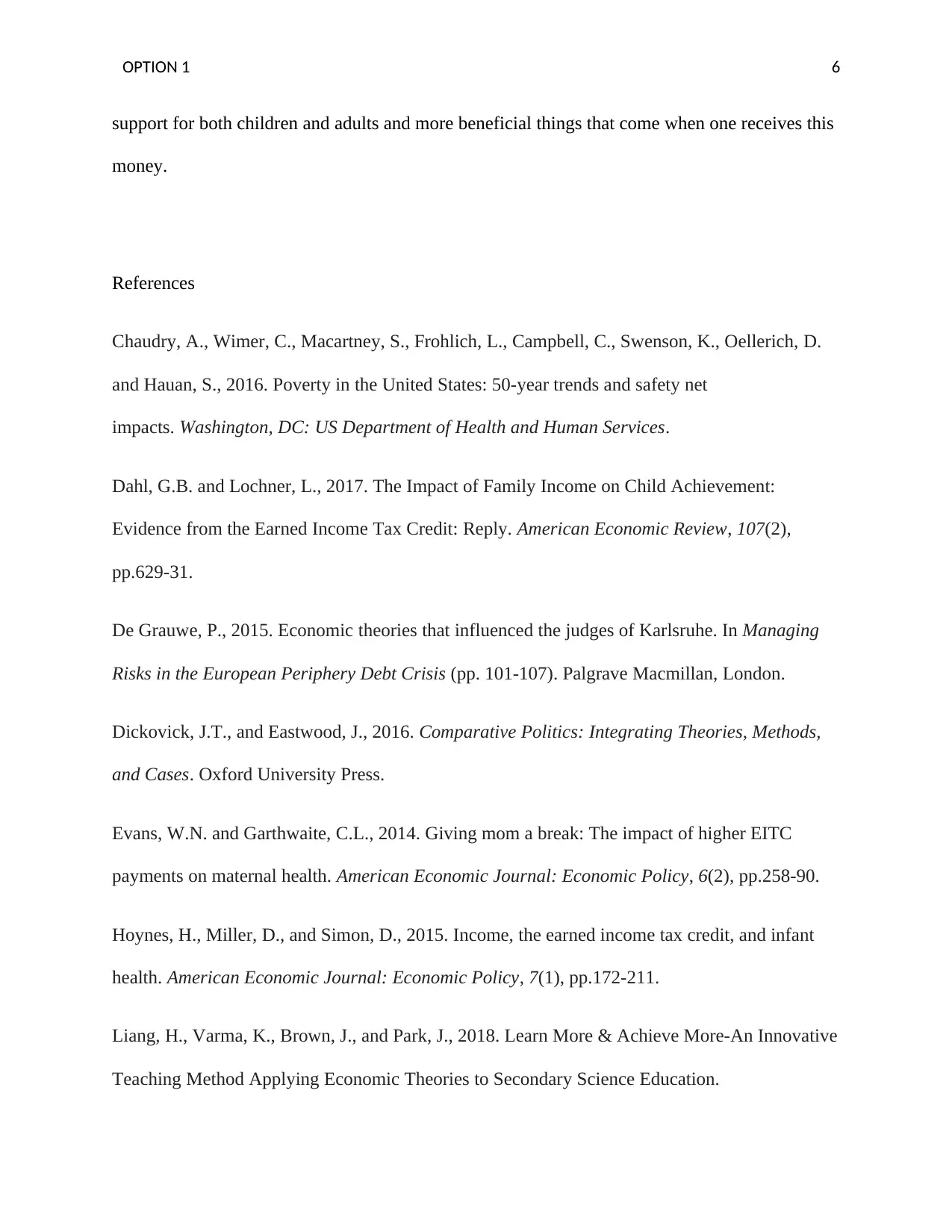
OPTION 1 6
support for both children and adults and more beneficial things that come when one receives this
money.
References
Chaudry, A., Wimer, C., Macartney, S., Frohlich, L., Campbell, C., Swenson, K., Oellerich, D.
and Hauan, S., 2016. Poverty in the United States: 50-year trends and safety net
impacts. Washington, DC: US Department of Health and Human Services.
Dahl, G.B. and Lochner, L., 2017. The Impact of Family Income on Child Achievement:
Evidence from the Earned Income Tax Credit: Reply. American Economic Review, 107(2),
pp.629-31.
De Grauwe, P., 2015. Economic theories that influenced the judges of Karlsruhe. In Managing
Risks in the European Periphery Debt Crisis (pp. 101-107). Palgrave Macmillan, London.
Dickovick, J.T., and Eastwood, J., 2016. Comparative Politics: Integrating Theories, Methods,
and Cases. Oxford University Press.
Evans, W.N. and Garthwaite, C.L., 2014. Giving mom a break: The impact of higher EITC
payments on maternal health. American Economic Journal: Economic Policy, 6(2), pp.258-90.
Hoynes, H., Miller, D., and Simon, D., 2015. Income, the earned income tax credit, and infant
health. American Economic Journal: Economic Policy, 7(1), pp.172-211.
Liang, H., Varma, K., Brown, J., and Park, J., 2018. Learn More & Achieve More-An Innovative
Teaching Method Applying Economic Theories to Secondary Science Education.
support for both children and adults and more beneficial things that come when one receives this
money.
References
Chaudry, A., Wimer, C., Macartney, S., Frohlich, L., Campbell, C., Swenson, K., Oellerich, D.
and Hauan, S., 2016. Poverty in the United States: 50-year trends and safety net
impacts. Washington, DC: US Department of Health and Human Services.
Dahl, G.B. and Lochner, L., 2017. The Impact of Family Income on Child Achievement:
Evidence from the Earned Income Tax Credit: Reply. American Economic Review, 107(2),
pp.629-31.
De Grauwe, P., 2015. Economic theories that influenced the judges of Karlsruhe. In Managing
Risks in the European Periphery Debt Crisis (pp. 101-107). Palgrave Macmillan, London.
Dickovick, J.T., and Eastwood, J., 2016. Comparative Politics: Integrating Theories, Methods,
and Cases. Oxford University Press.
Evans, W.N. and Garthwaite, C.L., 2014. Giving mom a break: The impact of higher EITC
payments on maternal health. American Economic Journal: Economic Policy, 6(2), pp.258-90.
Hoynes, H., Miller, D., and Simon, D., 2015. Income, the earned income tax credit, and infant
health. American Economic Journal: Economic Policy, 7(1), pp.172-211.
Liang, H., Varma, K., Brown, J., and Park, J., 2018. Learn More & Achieve More-An Innovative
Teaching Method Applying Economic Theories to Secondary Science Education.
⊘ This is a preview!⊘
Do you want full access?
Subscribe today to unlock all pages.

Trusted by 1+ million students worldwide
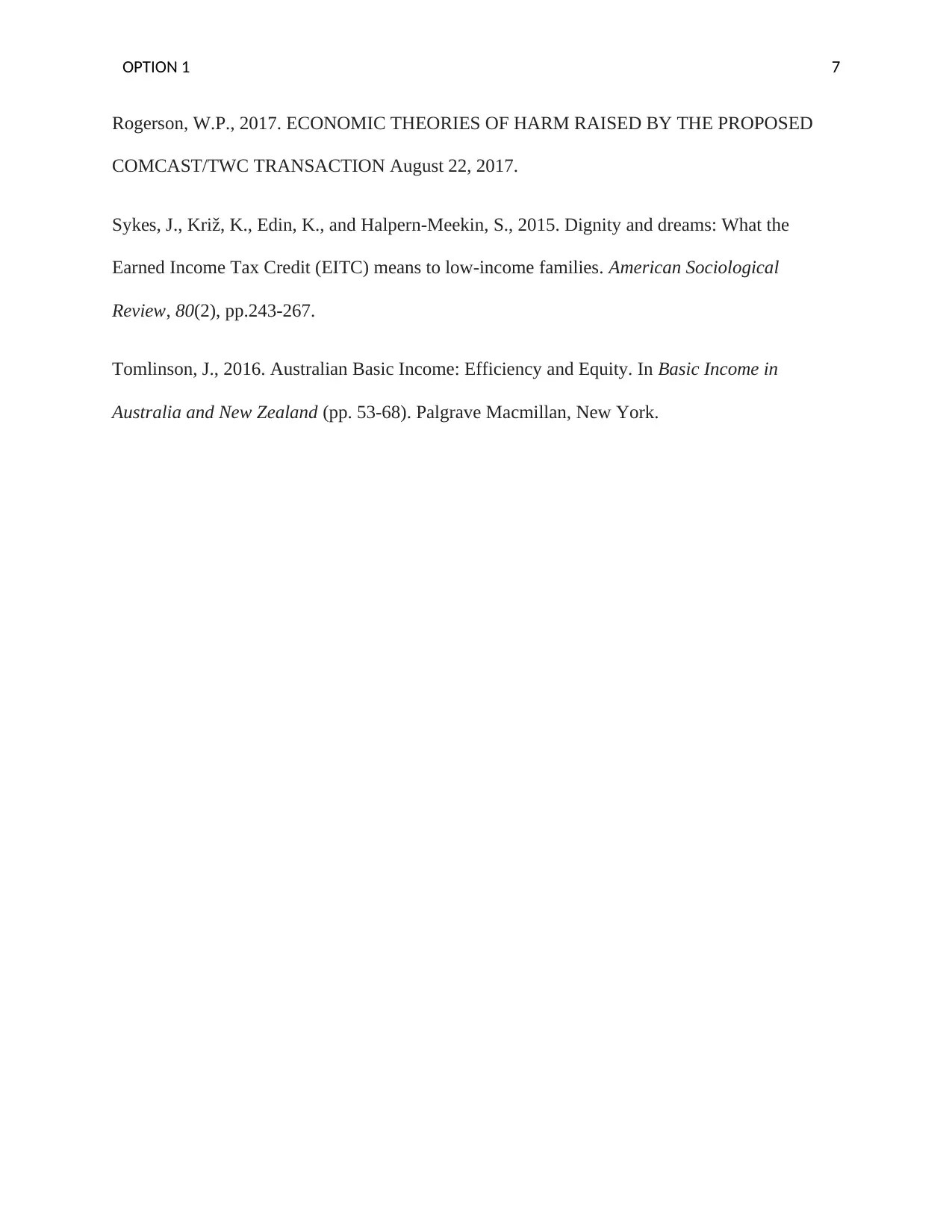
OPTION 1 7
Rogerson, W.P., 2017. ECONOMIC THEORIES OF HARM RAISED BY THE PROPOSED
COMCAST/TWC TRANSACTION August 22, 2017.
Sykes, J., Križ, K., Edin, K., and Halpern-Meekin, S., 2015. Dignity and dreams: What the
Earned Income Tax Credit (EITC) means to low-income families. American Sociological
Review, 80(2), pp.243-267.
Tomlinson, J., 2016. Australian Basic Income: Efficiency and Equity. In Basic Income in
Australia and New Zealand (pp. 53-68). Palgrave Macmillan, New York.
Rogerson, W.P., 2017. ECONOMIC THEORIES OF HARM RAISED BY THE PROPOSED
COMCAST/TWC TRANSACTION August 22, 2017.
Sykes, J., Križ, K., Edin, K., and Halpern-Meekin, S., 2015. Dignity and dreams: What the
Earned Income Tax Credit (EITC) means to low-income families. American Sociological
Review, 80(2), pp.243-267.
Tomlinson, J., 2016. Australian Basic Income: Efficiency and Equity. In Basic Income in
Australia and New Zealand (pp. 53-68). Palgrave Macmillan, New York.
1 out of 7
Related Documents
Your All-in-One AI-Powered Toolkit for Academic Success.
+13062052269
info@desklib.com
Available 24*7 on WhatsApp / Email
![[object Object]](/_next/static/media/star-bottom.7253800d.svg)
Unlock your academic potential
Copyright © 2020–2026 A2Z Services. All Rights Reserved. Developed and managed by ZUCOL.


